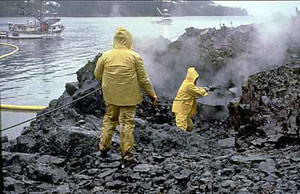Supreme Court Slashes Exxon Valdez Penalty
Nineteen years ago, the Exxon Valdez supertanker struck a reef in Alaska, causing an environmental catastrophe so devastating its impact continues to be felt. A court later slapped Exxon with $5 billion in punitive damages, but on Wednesday the Supreme Court ruled that the oil giant shouldn't have to pay more than about a tenth of that amount.
Nineteen years ago, the Exxon Valdez supertanker struck a reef in Alaska, causing an environmental catastrophe so devastating its impact continues to be felt. A court later slapped Exxon with $5 billion in punitive damages, but on Wednesday the Supreme Court ruled that the oil giant shouldn’t have to pay more than about a tenth of that amount.
Your support matters…New York Times:
The Supreme Court on Wednesday reduced what had once been a $5 billion punitive damages award against ExxonMobil to about $500 million. The ruling essentially concluded a legal saga that started when the Exxon Valdez, a supertanker, struck a reef and spilled 11 million gallons of crude oil into the Prince William Sound in Alaska in 1989.
The decision may have broad implications for limits on punitive damages generally. Punitive damages, which are meant to punish and deter, are imposed on top of compensatory damages, which aim to make plaintiffs whole.
Justice David H. Souter, writing for the majority in the 5-to-3 decision, said a ratio between the two sorts of damages of no more than one-to-one was generally appropriate, at least in maritime cases. Since Exxon has paid about $507 million to compensate more than 32,000 Native Alaskans, landowners and commercial fishermen, Justice Souter said, it should have to pay no more than that amount in punitive damages.
Independent journalism is under threat and overshadowed by heavily funded mainstream media.
You can help level the playing field. Become a member.
Your tax-deductible contribution keeps us digging beneath the headlines to give you thought-provoking, investigative reporting and analysis that unearths what's really happening- without compromise.
Give today to support our courageous, independent journalists.






You need to be a supporter to comment.
There are currently no responses to this article.
Be the first to respond.